Run The Series: SCREAM
A spoiler-free collection of thoughts on all 6 films in the Ghostface saga so far.
SCREAM (1996)
★★★★★
- "Never ever ever, under any circumstances say 'I'll be right back', because you won't be back."
- "I'm gettin' another beer, you want one?"
- "Yeah, sure."
- "I'LL BE RIGHT BACK!"
Scream is perhaps the single biggest catalyst for my pre-teen self evolving from a slightly-more-than-casual horror film fan, to a lifelong horror film obsessive who fell in love with the genre.
I remember that my mother bought me the first three films on DVD, during one or more visits to the big ASDA supermarket in Stevenage, when I was about 11 years old in the mid-2000's. Before then, I was more than aware of Scream's existence purely through the pervasive pop culture osmosis that resulted from its influence. Even if you'd never seen the film itself, you were already sure to be familiar with the iconic Ghostface mask and costume. Besides that, if you ever watched any DVD's that were Disney subsidiary distributions of movies by Miramax or Touchstone, the pre-main menu trailer reels would inevitably feature trailers for Scream, and/or one of its sequels, and/or an advertisement for the entire trilogy on DVD that spliced together moments from all three films to Marco Beltrami's 'Trouble in Woodsboro' cue.
And that's all before you even got to the Scary Movie movies acting as their own kind of Scream gateway for kids and teens around my age back then.
Prior to Scream schooling me in the tropes and clichés of the slasher corner of the broader horror genre, my education in horror movies had been long and studious, in large part thanks to my mother being quite lax about the sorts of grown-up films I was permitted to watch.
(Her vague, inconsistent philosophy was that if a movie had a lot of special effects, up to and including the gory kind, it was fine for me to watch it, because I was learning something about how movies were made in the process. Sex and nudity? Oh heavens no, close thine eyes to that sinful stuff every time it happens! But gratuitous blood and guts and visceral violence? Sure! Movies don't make psychos! They just make psychos more creative!)
Thus, by the time I finally saw Scream, I'd already gotten under my belt the likes of Poltergeist, A Nightmare on Elm Street, Carrie, Psycho, Saw, Ghost Ship, Final Destination, The Ring, The Thing, The Fly, The Omen, The Shining, The Silence of the Lambs, and a glimpse of the end of Society, just to name a few.
So what was it about Scream that marked such a turning point in my abiding appreciation for horror?
Answer: everything.
So many layers to its appeal, so many spinning plates that Wes Craven and Kevin Williamson miraculously managed to keep perfectly balanced, in a truly lightning-in-a-bottle triumph.
There's the hilarity of its comedy, sometimes teetering on the edge of almost becoming a Mel Brooks-style outright spoof of slasher movies by virtue of its forays into unapologetic goofiness, exemplified by the cartoonishly exaggerated Foley sound effects where scissors snapping and knives unsheathing sound like Wolverine's adamantium claws slicing air, not to mention Jamie Kennedy's self-aware comedy sidekick (like if Danny from Last Action Hero grew up into a horror nerd), and Matthew Lillard delightfully doing The Most Acting as he chews up the scenery like it was made of Scooby Snacks.
There's the genuine scares and suspense and gnarly violence that Craven imbued the proceedings with, the humour never once detracting from the horror, and the horror never diluting the humour in return.
(I confess that this scariness only worked on me upon my first ever viewing, when I got got by the jump scares - both the real and fake-out ones - and the fear of all that which was then unknown to me about the future twists the plot would take making every life-or-death chase scene a nail-biting experience. Now that I've since seen Scream so many times that every frame is forever imprinted on my brain, the scares obviously can't be as potent as they once were. Even so, the fact that Craven and Williamson repeatedly pull off the trick of explicitly telling us - the audience - about the formula that goes into every scene of a horror movie, before then indulging in that selfsame formula, while also slightly subverting it, and adding humour, and being as grisly and bloody and terrifying as any of the best, more straightforward horror movies have ever been? It's absolutely marvellous.)
There's the groundbreaking self-referentially meta commentary on how horror movies are written, made, and responded to by audiences and the media. (Which isn't to discount Craven's New Nightmare having already done it a few years beforehand; merely to say that it took Scream's success to make that self-aware style game-changingly popular.) This extends to two key factors that inform the entire Scream franchise:
1) The wellspring of enthusiastically encyclopaedic knowledge about horror film history, and movies as a whole. (After all, Scream was the film that informed me of the existence of movies like Prom Night and The Town That Dreaded Sundown; showed me my first ever glimpse of John Carpenter's Halloween; informed me that Halloween's killer was named Michael Myers, and informed me Friday the 13th's killer wasn't Jason Vorhees to start off with).
And then there's:
2) The bone-deep criticism, throughout the whole series, of how mainstream media and American culture reacts to violence in movies, and violence in real life. You could almost call Scream prescient for how relevant the series feels about tackling what we'd now call the "true crime" phenomenon, were it not for the sad reality that people have had an insatiable hunger for consuming all sorts of content produced about true crime for decades, centuries even. The media frenzy and morbid public fascination with Jack The Ripper, and the sickening spree of unspeakably brutal murders attributed to that name in the late 19th century, is much the same as with Ted Bundy and Jeffrey Dahmer and OJ Simpson in the 20th century, or with any of the thousand crimes you see discussed as fodder for podcasts and TikToks and YouTube videos every single day in our young 21st century. The disturbing pattern of this recurring human behaviour, this voracious desire to removedly perceive trauma and victimisation and death through a lurid lens of entertainment and spectacle throughout history doesn't change; it's just the means through which true crime is covered that changes. Be it newspapers, tabloids, books, movies, TV shows, live TV news, or social media, people have always found a way to turn tragedy into profit, commodifying crimes into content to boost someone somewhere's fame and/or fortune. (“One generation's tragedy is the next one's joke,” as Dewey will go on to say in Scream 4.)
What this series always focuses on is interrogating the role that the media plays in exploiting and perpetuating violence, and the recursive chicken-or-egg cycle between horror happening in life, art being made about that horror, art being blamed for inspiring further horrors in real life, which begets art that begets life that begets art, for forever. The nuance all the Screams lean into is every horror film fan's knowledge that horror movies are most often just reflections and abstractions of real life depravities and injustices; a safe space to delve into the deepest darkest corners of the human psyche, and the darkest acts that people can do to one another, without anyone really getting hurt. Horror movies are like exorcisms for the mind, a means to expel and confront our worst fears and thoughts and impulses from within. But as every Scream also covers, the media's capitalistic urge to revel in every gory detail, for the benefit of viewership ratings on TV, sales made from the multiple books written on the same subject, the jobs and box office figures opened up by making dramatised versions of the real events, and whatever other avenues can be found to make money milking a true crime story dry, is its own vicious circle that turns ordinary people's lives into a circus out of their control, solely for the voyeuristic enjoyment and profit of a wider world that more often than not just sees them as characters in a story being told by others around them. Think of it as the “Floyd Collins Effect”... or if you prefer, the “Ryan Murphy/Daniel Farrands Effect”, what with the ethical controversies over Murphy's Dahmer Netflix show, or Farrands' ongoing mission to turn the stories of every notorious American killing spree into some of the worst, most tasteless piece-of-shit movies ever made - i.e. The Haunting of Sharon Tate (2019), The Murder of Nicole Brown Simpson (2019), Ted Bundy: American Boogeyman (2021), and Aileen Wuornos: American Boogeywoman (2021).
The irony to the fact that Farrands was also the guy who directed the feature-length 2011 documentary, Scream: The Inside Story, is not lost on me.
I could go on and on and on about the myriad ways Scream is dense with layers upon layers of rich thematic, stylistic, satirical, and characterful detail to relish in. And that's perhaps the most important element of all: the characters. For if the likes of Sidney, Gale, Dewey, Randy, et al, weren't as fleshed-out and unique and witty and believably, relatably human as Williamson wrote them to be, and if these characters weren't so wholly inhabited by the brilliant performances of Neve Campbell, Courtney Cox, David Arquette, and Jamie Kennedy (plus Drew Barrymore, Skeet Ulrich, and Matthew Lillard of course), we'd have scarcely any reason to care about these people. But no matter whether their performances alternate between grounded naturalism (particularly with Campbell, the soulful bedrock to this whole franchise, and one of the greatest Final Girls of all time), or camp-tastic wild abandon (that'll be Kennedy and Lillard, naturally), every character is distinguishedly memorable, their collective chemistry is off the charts, and AAAAHHHHHH, IT'S JUST ALL SO GOOD.
I love Scream - the film, and the franchise (not counting the TV show, which I never watched) - to the moon and back.
It crystallised my personality as a nerd about movies, and a nerd for horror. It scared me, thrilled me, shocked me, made me laugh harder than many full-blown comedies had managed to, made me a fan of Marco Beltrami's music (with what was his first score ever!), and made me a lifelong fan of fellow August 2nd birthday boy, Wes Craven, who is still deeply missed to this day.
Scream is love. Scream is life.
And now, I have to go get something to eat, because I've been writing this review for a bum-numbingly long time, so if you'll excuse me...
...I'll be right back.
SCREAM 2 (1997)
★★★★
- "What's your favourite scary movie?"
- "Showgirls. Absolutely frightening."
I've never been a big fan of the fraternity/sorority faff that populates the college-set plot of Scream 2; objectively, it is merely a minor bump in the road that doesn't really take up too much screen time (even though those short scenes of raucous partying and drunken shenanigans do feel like they drag down the film's momentum here and there), but that aspect of the film has always been a bugbear of mine, so I thought I ought to mention it.
Otherwise, Scream 2 is very much a worthy follow-up to its esteemed predecessor.
The seam of dark comedy running through the slasher trappings remains hilarious, with David Arquette and Jamie Kennedy a dream team for bringing the laughs.
The horror and suspense is ratcheted up a notch, including some of the most sphincter-tighteningly tense and disturbing sequences in the whole franchise. (The opening cinema scene! The recording studio scene! The CAR ESCAPE SCENE, JFC!!)
The meta-commentary on horror sequels, and mainstream media breeding cynical minds hellbent on the destruction of people's lives for the sake of money, infamy, and grinding up tragedy and trauma into the gears of the entertainment industry machine to keep it chugging along, is as astutely observed as ever in its biting satire.
The soundtrack is awesome likewise, with Marco Beltrami bringing back the orchestral pomp and circumstance, alongside guest composer Danny Elfman's operatic 'Cassandra Aria', and tracks from Hans Zimmer's Broken Arrow score being used as Dewey's Morricone-esque guitar theme (which as a kid I recognised from Broken Arrow as soon as I heard it, and I wondered why they the heck they'd used music from that film of all things, before I'd grow up and later find out about temp music, and that in Scream 2's case, they just bought the rights to Zimmer's score to keep the temp music in).
All in all, Scream 2 is a damn solid sequel, and an incredible feat of seat-of-their-pants filmmaking ingenuity from Wes Craven and Kevin Williamson, seeing as they not only made the film under a massive time-crunch to get it released just a year after the first film, but also had to scramble to change the plot and rewrite so much of the original script at short notice daily, thanks to the initial intended screenplay getting leaked online, and cocking up their plans.
(The Internet! The bane of Hollywood's existence for 30+ years!)
On an unrelated note:
WILL FORTE, WHAT ARE YOU DOING HERE?!
Or, I guess, what are you not doing here…?
SCREAM 3 (2000)
★★★½
- "What's your favourite scary movie?"
- "My life."
I used to think that Scream 3 was the second-weakest entry in the franchise, behind what I once considered to be the first-weakest, Scream 4.
However, to my surprise, upon this up-to-date marathon of every Scream movie, I found myself changing my old opinions, wherein I now like 4 way more than I used to, and I like 3 about the same amount... which in this case means that I think it's the least good Scream.
Yet even my least favourite Scream still has plenty about it to enjoy, in spite of the things that leave it relatively lacking compared to the films that came before and after it.
Scream 3 feels the most like a compromised product, the plot's weird detours and red herrings jutting out like hangovers from a multitude of different versions of the script, the jostling for unpredictability - in the face of the leak-happy internet always threatening to spoil the fun - making the film seem a lot messier than intended. In fairness, the inherent fear that comes with the territory, where the characters are forced to see anyone and everyone as suspects, does paper over the cracks a little bit, but only slightly.
Also, the magic voice-changer - while great as a concept for heightening the who-can-you-trust? atmosphere to The Thing-levels of intense paranoia, as it gives the killer(s?) a way to vocally shapeshift and sow suspicion, division, and confusion - is just too big a stretch, and too big of a plot hole-creator, to fully buy into. The time period means we know such technology couldn't possibly exist yet, though even that could be hand-waved away with an argument such as: "Well, in this world, technology like this does exist, so suspend your disbelief about it so that the movie can happen, m'kay?" Which would be fine, were it not for the simple problem of: how did the killer(s?) get perfectly recorded audio of the characters they want to pretend to be, so that this tech could replicate their voices flawlessly?
I know, I know, it's movie logic, so shouldn't be taken seriously... but dang it, it really does bug me.
Plus, the eventual big third act reveal feels the most lacklustre out of any of the Screams, what with all the ret-conning, the substandard appropriate build-up to justifying the reveal that would make later rewatches change your perspective on how you saw certain people's interactions, and the generally unearned emotional pathos it strives for.
Besides those flaws, however, the things that can be enjoyed about Scream 3 make the rougher parts easier to swallow.
While they don't get to share as much screen time together as one would like, the Scream trio of Neve Campbell, Courtney Cox, and David Arquette are a joy to share the company of for a couple of hours (even if Courtney's infamously unfortunate haircut looks worse than that time in Friends when Phoebe mistakenly gave Monica a Dudley Moore haircut instead of a Demi Moore one).
The head-spinning doses of heavy-meta self-referentialism are beautifully compounded by the in-universe Stab movies adding further layers of commentary on Hollywood adapting true crimes into fictionalised filmic money-makers.
Old crime scenes recreated as artificial sets on some studio backlot, past traumas resurrected as uncanny dreamlike reconstructions for actors to perform in, like Caden Cotard in Synecdoche, New York turning tragedy into a performance for others to play, before turning that performance into yet another performance for other actors to populate, nestling the truth within absurd numbers of layer upon layer of artistic artifice like a Russian doll.
Actors playing actors playing real people within the film's world.
The real-life romantic relationship between Cox and Arquette being mirrored by their characters of Gale and Dewey, as these films and their lives become forever inextricably entwined.
Also, there's Parker Posey's magnificently hilarious, über-camp performance as the preposterous actress playing the Stab movies' version of Gale Weathers, the mellifluously-voiced Patrick Warburton as her bodyguard, and the various fun cameos sprinkled here and there (which I won't spoil if you're still lucky enough to not know about them yet).
Of course, the most significant aspect to the plot that has come to make Scream 3 horribly prophetic and relevant well beyond its original release, is in its concerns with the rampant sexual abuse of women in Hollywood by powerful men exerting their toxic influence from behind the scenes, out of the eyes of the public. Personified by Lance Henriksen's lecherous producer character - and manifested by the horrific subtextual implications of the intricate production design of his labyrinthine mansion, filled with secret rooms and two-way mirrors - it's astounding that Wes Craven and Ehren Krueger were permitted to keep this subplot in the film, considering it was being funded, overseen, and distributed by Miramax/Dimension - a.k.a. Bob and Harvey Weinstein.
Did Harvey read the script, and/or see the film, and was too narcissistic to recognise his own evil reflected in the story?
Or did he recognise it immediately, but didn't interfere because doing so might raise suspicions about him... or worse, he was arrogant enough to let it slide, because he thought he'd never be caught or punished, and people would just forever think this subplot had no basis in reality?
Or did he have no input whatsoever, and it was all on Bob, seeing as Dimension Films was more Bob's thing than Harvey's?
Will we ever know? Can we ever know? And does it even matter, now that the orc-faced plant-fucker is in jail for the rest of his miserable life?
One thing's almost positive about that bastard, though:
He definitely won't be right back.
But as for the Scream movies themselves?
Well, that's another story...
SCREAM 4 (2011)
★★★★
- "Oh, poor Sidney. You think this is all about you? You think you're still the star?"
- "This isn't a fucking movie!"
- "It will be..."
And to think this was once my least favourite entry in the Scream saga.
Back when it first came out, Scream 4 seemed like such a disappointing misstep for this rock-solid franchise, that its abbreviated title of Scre4m became a bit of a meme for a little while, with the derisive pronunciation of "Scre-Four-Um" acting as an indictment of the silliness of the title, and the mediocre reception the film faced at the time. (The same thing would happen 4 years later with the release of Josh Trank's Fantastic Four, where its own Fant4stic abbreviation made it a punchline for people online to call it "Fant-Four-Stic," but that's not important right now.)
I was an 18 year-old die-hard Scream fan in 2011, and my first impression of this then-modern day, brand new Scream sequel - with Wes Craven, Kevin Williamson, Peter Deming, Marco Beltrami, Neve Campbell, Courtney Cox, and David Arquette all returning - was that it... kinda sucked, sadly.
I didn't like the change in cinematography, where every frame was slathered in a high-contrast, super-saturated sheen of artificiality, and the preponderance of Janusz-Kaminsky-esque bloom everywhere made everything look as though Deming had smeared Vaseline on all the lenses.
I thought that the plot's implementation of the internet, smartphones, social media, and live-streaming all felt phoney, and by extension that the writing of the new generation of teen characters felt out of touch, as if Williamson had produced the screenplay equivalent of "How Do You Do, Fellow Kids?", or "Old Man Yells At Cloud".
Adjacent to that last point, while I did think the finale was the best part of the film, I was simultaneously not a fan of the third act's ferociously cynical attitude towards how it thought online culture was capable of effecting the youth of today to do terrible things in the name of views.
Oh, how woefully misguided I was.
Because lo and behold, Craven and Williamson weren't behind the times, like I believed they were.
No... if anything, they were ahead of the curve.
Their fears were justified, and their portrayal of a culture insidiously impacted by social media and viral fame - which once seemed to me to have more of a sensationalist affinity with Reefer Madness - turned out to not be cynical enough.
For in the decade-plus that's elapsed since Scream 4 was released, we've seen kids challenging each other to eat Tide Pods... countless people pranking each other with fake kidnappings, fake assaults, and fake deaths... JayStation holding fake seances for dead celebrities, and pretending his girlfriend died in a car crash... Logan Paul filming a dead body in the Suicide Forest... a mass shooter live-streaming his killing spree while spouting PewDiePie memes... and innumerable other examples of shockingly stupid, reckless, immoral, and sometimes downright evil acts, all perpetrated and perpetuated with the same blindly sought-after goals in mind:
To get views. To get notoriety. To get fans.
Which means that, fortunately for the film's quality, but unfortunately for the state of society and the soul of humanity, Scream 4 has aged incredibly, almost too well.
The disturbing prescience of its thematic convictions aside, what I've also come to like about Scream 4 are the things I failed to appreciate the first time around, all those years ago.
I can buy into the film's drastic change in cinematography actually being part and parcel of the entire meta-commentary about the excessively polished, music-video style of the scores of horror reboots and remakes that had come out before Scream 4 arrived to comment on the state of horror cinema during the 2000's and early 2010's. (I also like just how inky-black the lighting and colour grading makes certain scenes, especially the one with Ghostface standing in the middle of that empty nighttime road, watching the victim they just stabbed in the brain(!) flail and crawl away, the camera's increasing distance making Ghostface's black costume melt into the darkness as the depth of field makes the background blurrier and blurrier, until you can only see the spookily spectral white outline of the Ghostface mask, tilting inquisitively Michael Myers-style at their carnage wrought.)
The opening film-within-a-film-within-a-film gag is a tongue-in-cheek delight.
And the big third act reveal, plus its ensuing chaos, is a dementedly mean-spirited, jaw-droppingly twisted slice of supremely fucked-up genius. (To say which particular film this would totally go great with, in a thematically similar double-bill, might just spoil the twists of both, so I'll refrain from saying... but if you know, you know.)
How bittersweet that this was to be Wes Craven's final film, before he passed away just four years later.
Yet the fact that he got to put one last authorial stamp upon the horror movie landscape in which he began his career, with a film in a franchise he had directed every single entry of across 15 years, in a cinematic send-off worthy of his filmmaking talent and legacy?
That's a beautiful thing.
Here's to you, Wes.
SCREAM (2022)
★★★★
- "It's happening again... Do you have a gun?"
- "I'm Sidney fucking Prescott, of course I have a gun."
[Originally written in January 2022,
during the film’s theatrical release.]
Now that they've announced a sixth Scream will soon be forthcoming as a result of this fifth Scream being a critical and commercial hit, I am simply asking - nay, begging and pleading, down on my knees, for the love of all that is holy - that Radio Silence don't make their next Scream be this series' equivalent of Halloween Kills.
This Scream already made plenty of fun of what Halloween (2018) represented in the modern era of "requels", so much so to the point that this Scream's title itself is literally a meta in-joke ABOUT this very trend of requels just using the same name as the original film they're branching off from!
As it stands, 5cream is surprisingly, and thankfully, pretty damn good. Knowingly self-parodic and frequently funny, yet still thrillingly suspenseful and ultraviolent. Absolutely drenched in some of the most potent whodunnit paranoia this series has ever seen, with constant doubt, second-guessing, red herrings, double-bluffs, triple-bluffs, twisty-turny mental gymnastics, and a perpetual roiling anxiety electrifyingly fuelling every character's interactions with one another. And of course, it's fourth-wall-skirtingly meta, pop culture savvy, and hip to a fault, yet still brimming with an emotional pathos that respects the old and new characters of this universe that Wes Craven and Kevin Williamson created.
Now all I'm praying for is that Scre6m will keep this hot streak going, and not trip into the same pitfalls as the various requels that they poked fun at herein.
Radio Silence, my dudes, I beseech thee:
Don't pull a David Gordon Green and Danny McBride.
Don't make this a new trilogy, if you've got nothing else worthwhile to say beyond this one, and in your case, the next one.
And once again, because it bears repeating:
DON'T DO A HALLOWEEN KILLS!!
(Please and thank you, lol.)
SCREAM VI (2023)
★★★★
- "I've got one question for you."
- "Oh yeah, what's that?"
- "What's your favourite scary movie?"
- "Favourite scary movie?"
- "I'm asking because you're in one now. You're in my movie."
Neve Campbell’s Sidney was deadly serious in Scream (2022) when she said:
“After tonight, no more books, no more movies, no more fucking Ghostface.”
Unfortunately for her, the existence of Scream VI begged to differ, even as the studios refused (at the time) to pay Campbell the salary she was worth to come back, with the silver lining being that Sidney finally got a much-deserved sojourn away from Ghostface shenanigans. But then, in all their bountiful wisdom, Spyglass Entertainment deplorably decided to fire Melissa Barrera (leading to Jenna Ortega likely quitting in solidarity, and then everyone else that ought to have returned for the seventh film having the production fall apart around them, until virtually nobody was left), after Barrera voiced her support for Palestine in the wake of Israel’s ongoing genocide of the region it’s unlawfully occupying. Having shot themselves in the foot with their stupidity, Spyglass has rendered the upcoming Scream 7 as a project reeking of corporate desperation to salvage their cash cow franchise by any means necessary. Now they’re ready to pay Campbell enough money to bring her back, and they’ve got Kevin Williamson returning in tow to write and direct, all so that the sorry business of Spyglass’ malfeasant fuckery with the cast and crew of the critically and financially successful fifth and sixth Screams can get brushed under the rug. What a shit-show.
Anyway, before it unintentionally acted as the abrupt conclusion to Radio Silence’s tenure on the series, Scream VI may not have bested the classic original (as none of the sequels have ever reached those same heights, because how could they?), but Tyler Gillett and Matt Bettinelli-Olpin’s second Scream sequel - a.k.a. their sequel to their requel - was still a thoroughly entertaining continuation of the franchise's sprawling continuity, a viciously violent gore-fest, a hilariously paranoid whodunnit, a sphincter-tighteningly suspenseful thriller (my god, the subway sequence!), and all in all, another solidly enjoyable entry in this most solid of horror franchises.
Where could this series possibly go next?
In the word of Tim Curry in Command & Conquer: Red Alert 3:
SPACE!!
Come on, it's the next logical step!
Time to go full Jason X with Ghostface, yo!
It's what the people want!!



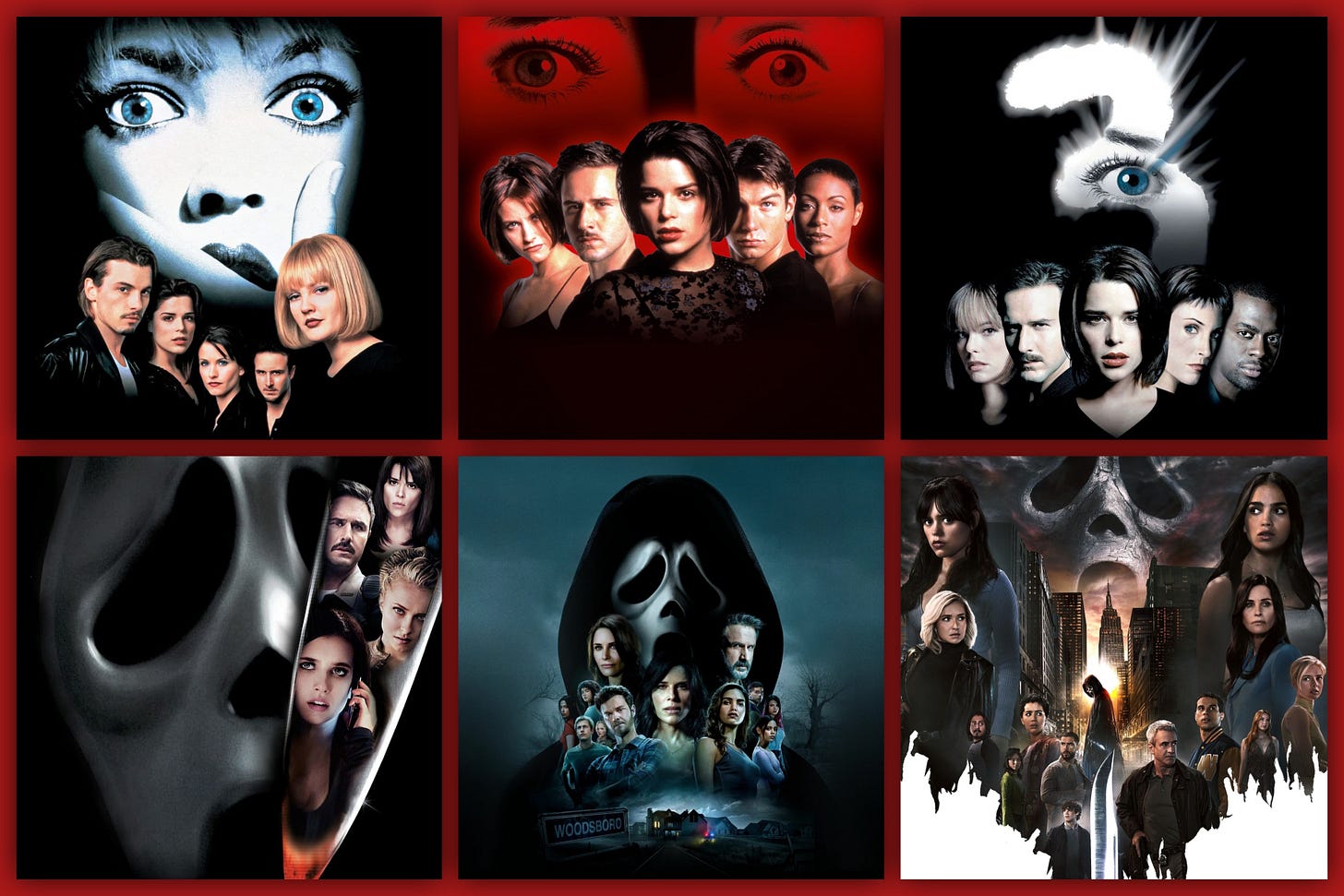
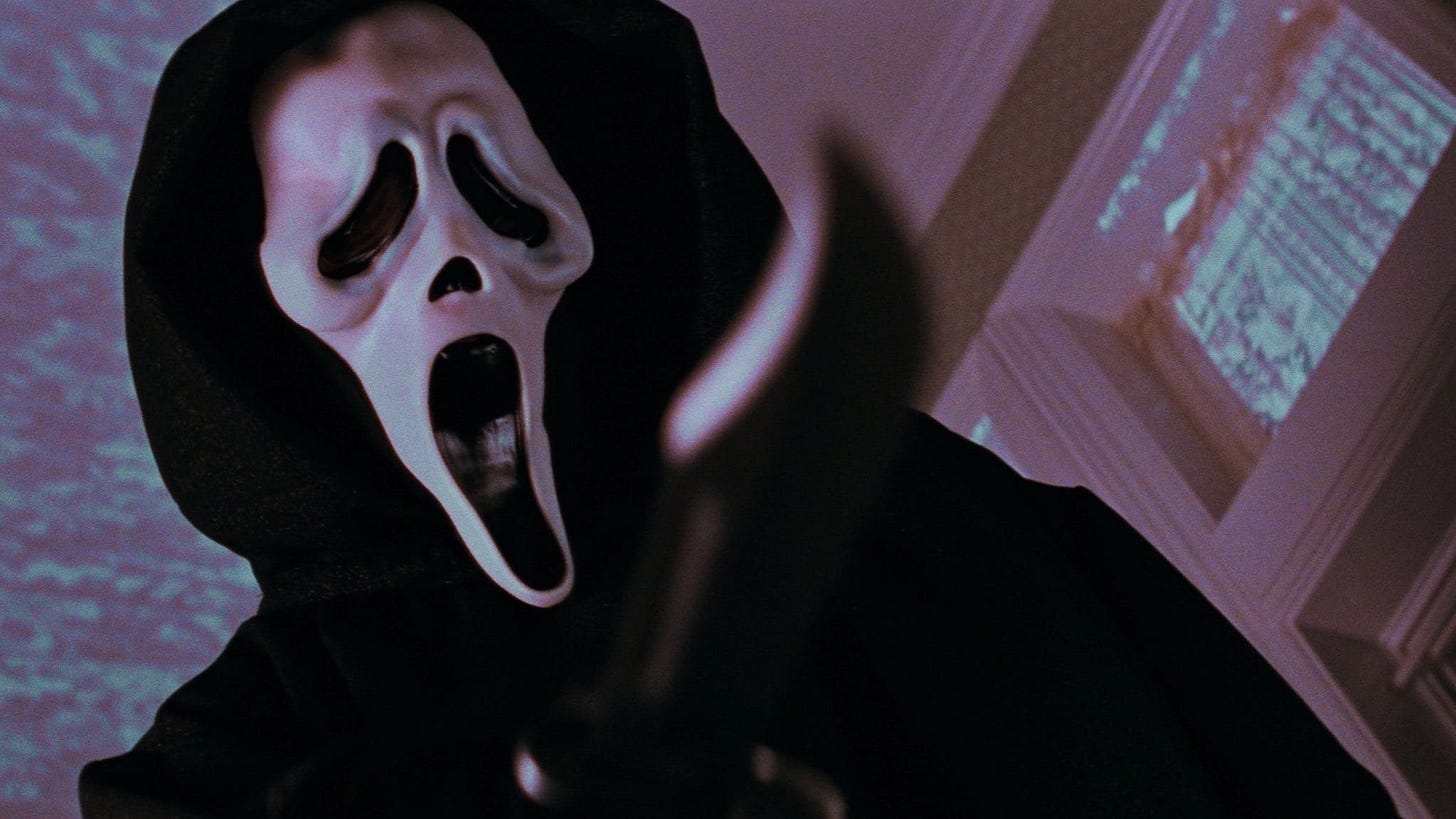
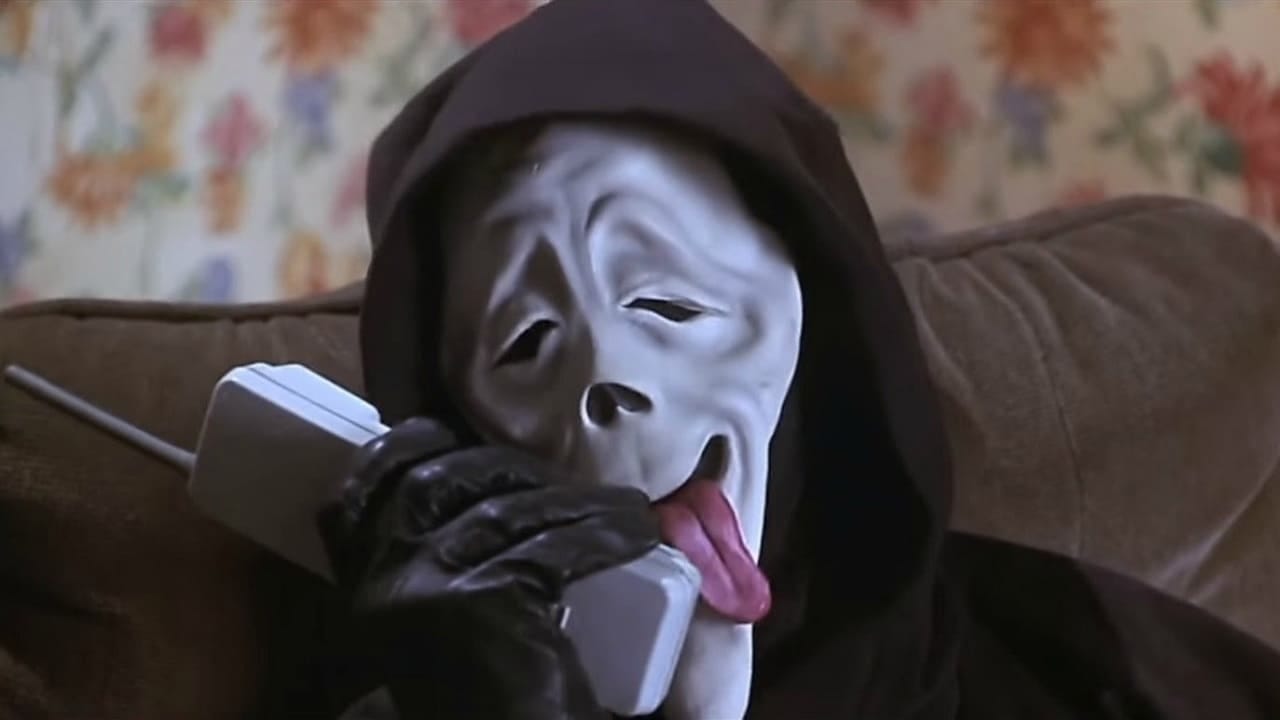
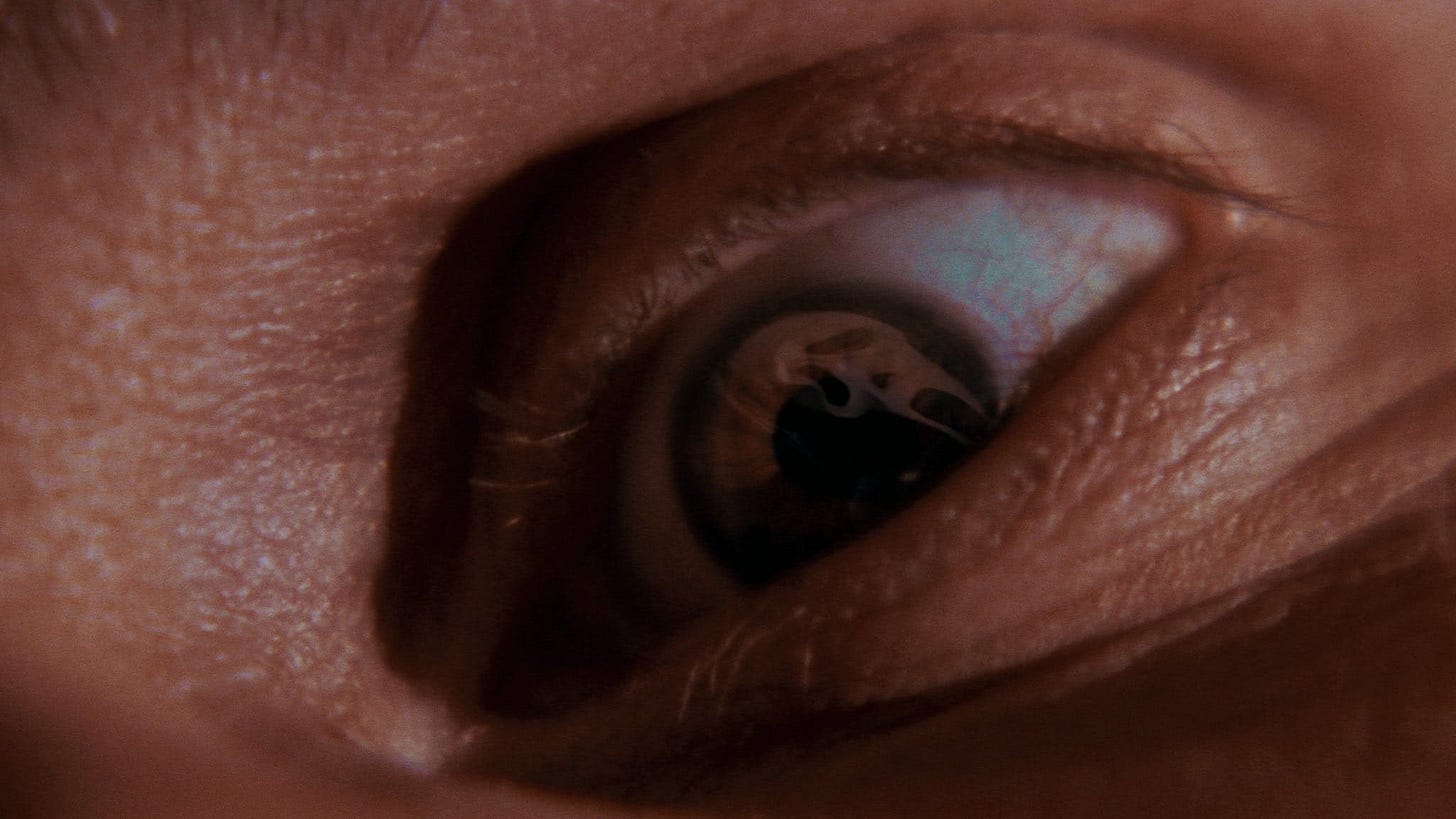
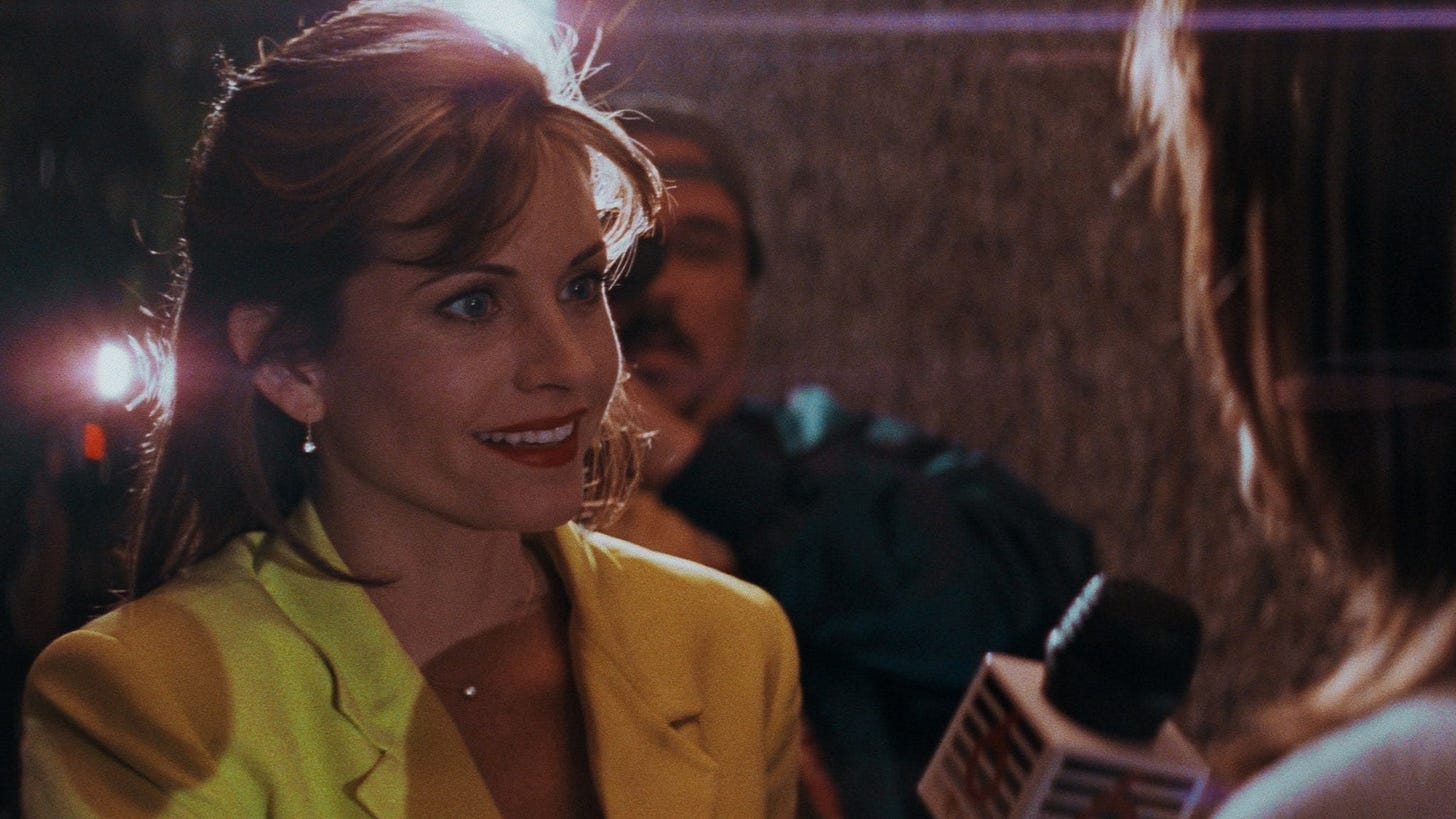
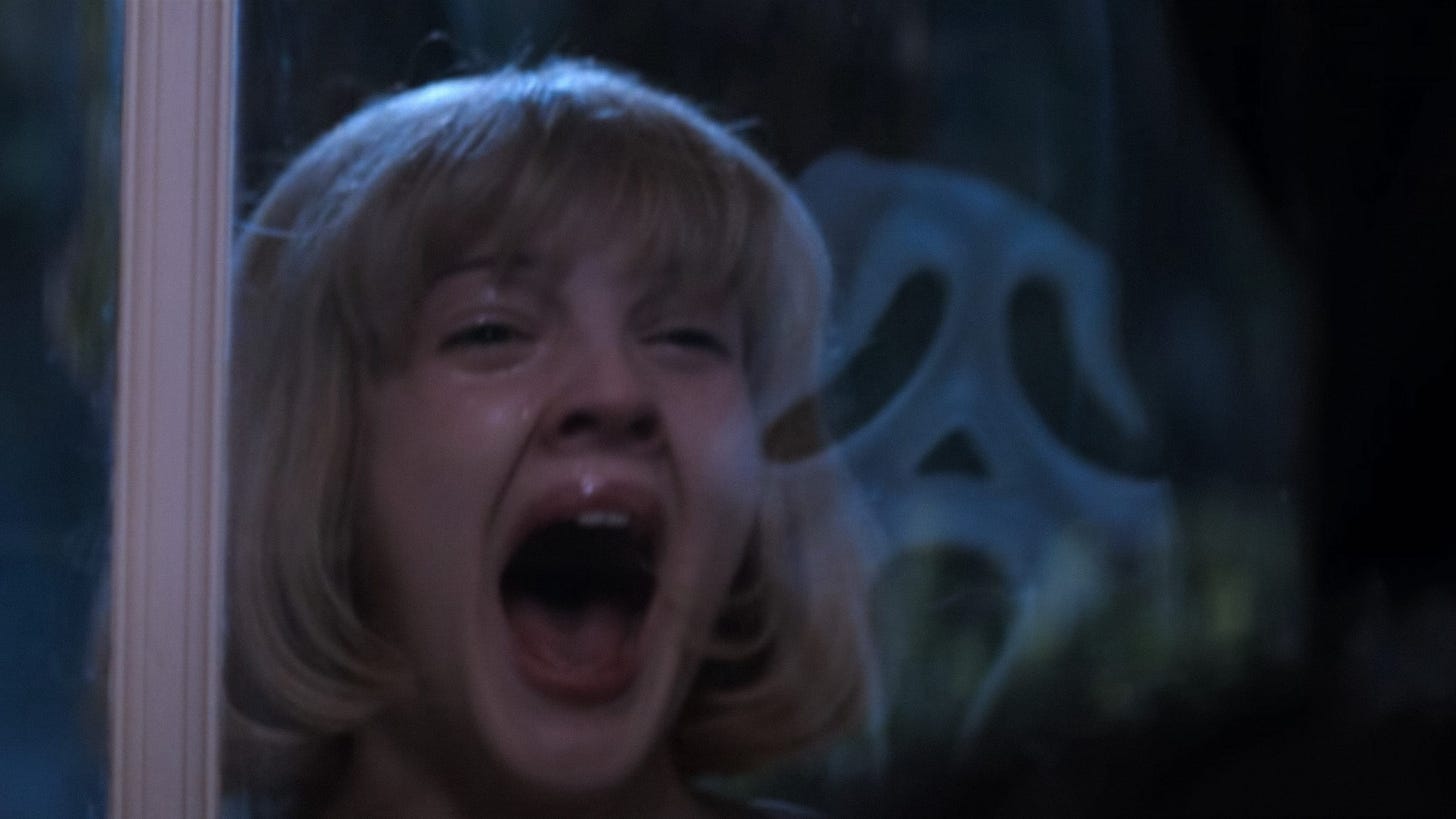
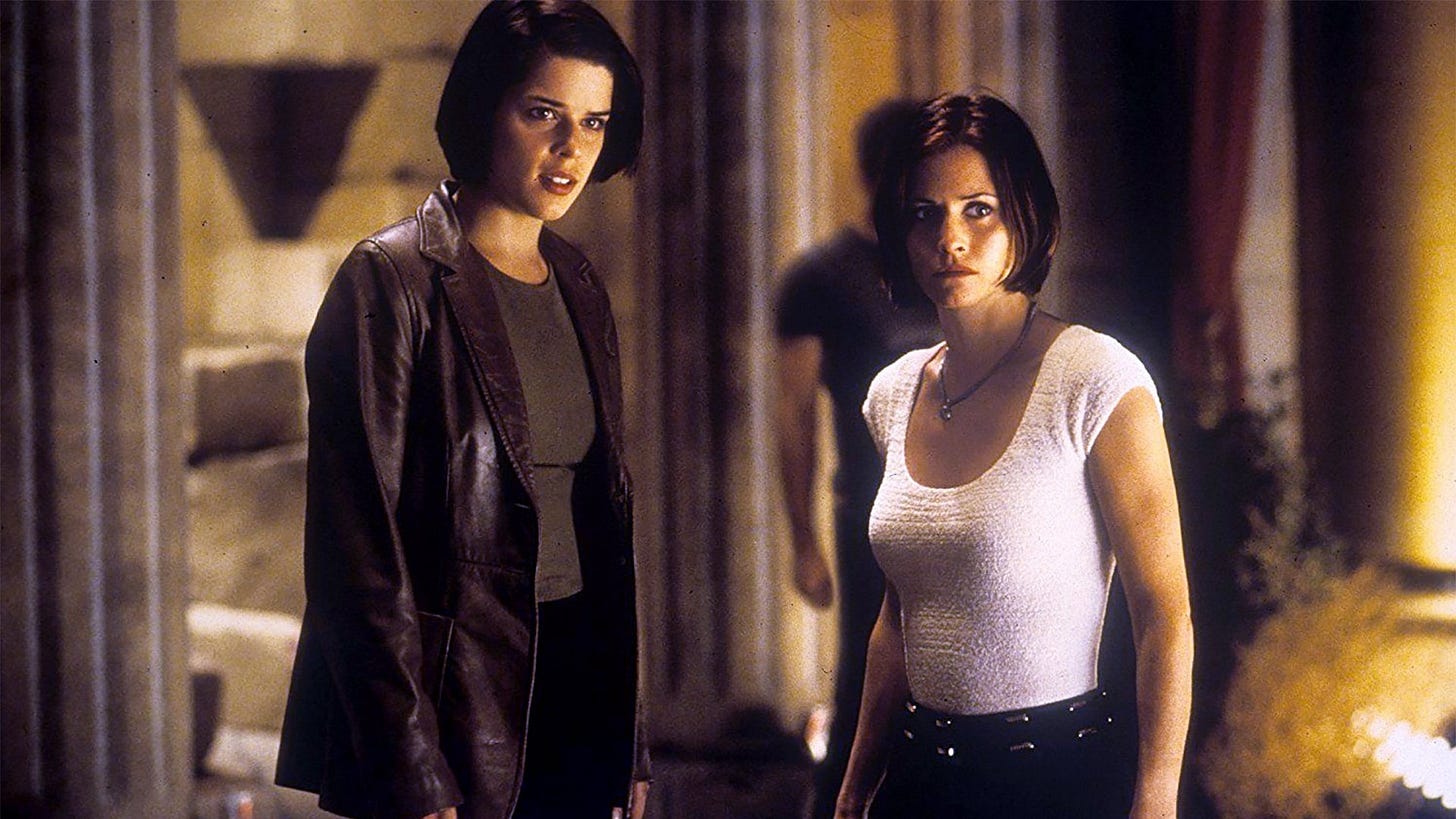
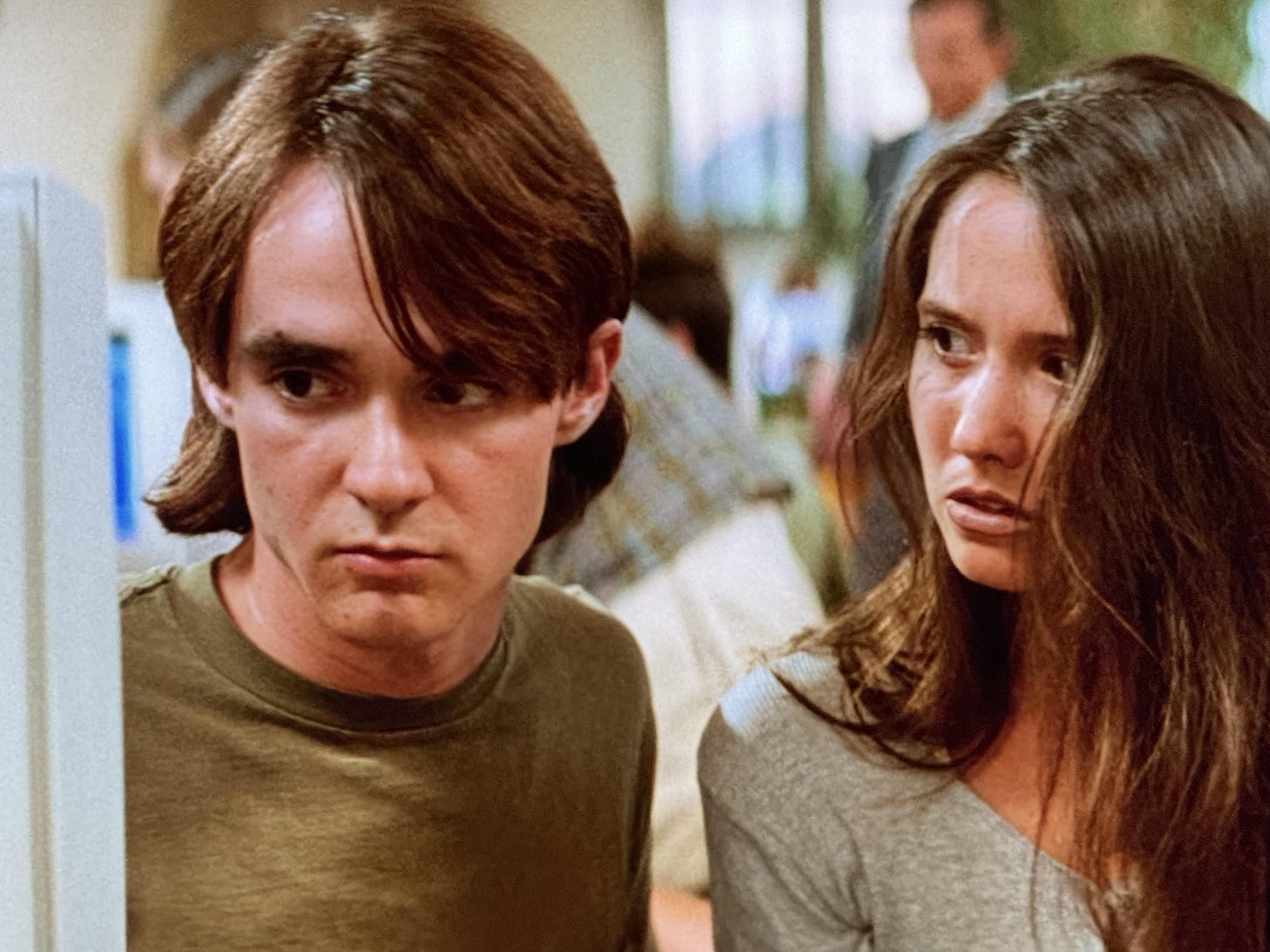
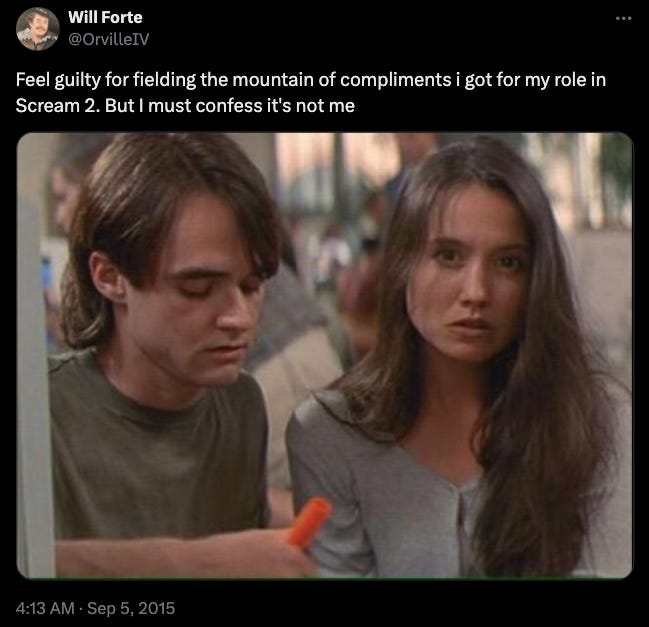
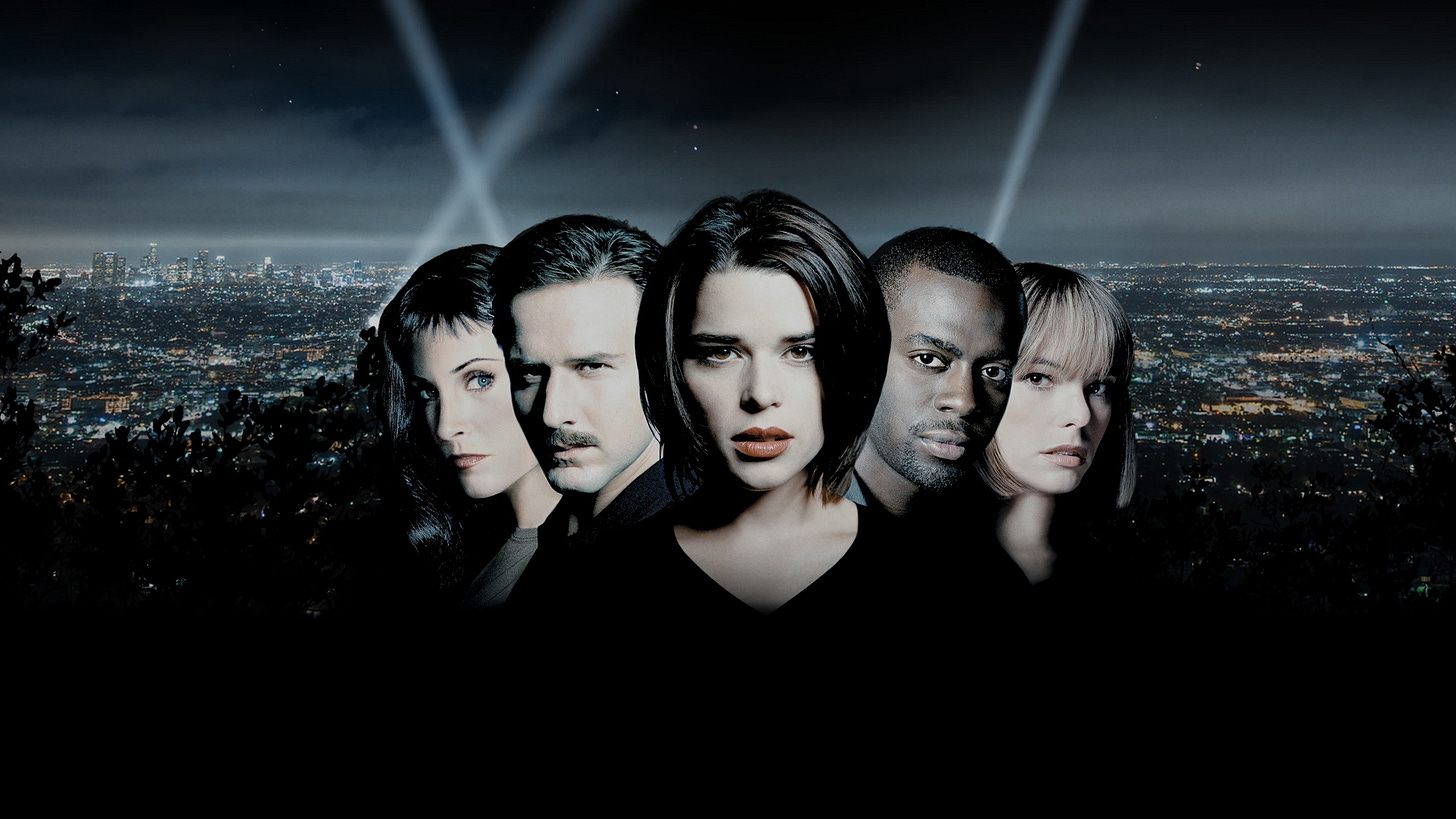
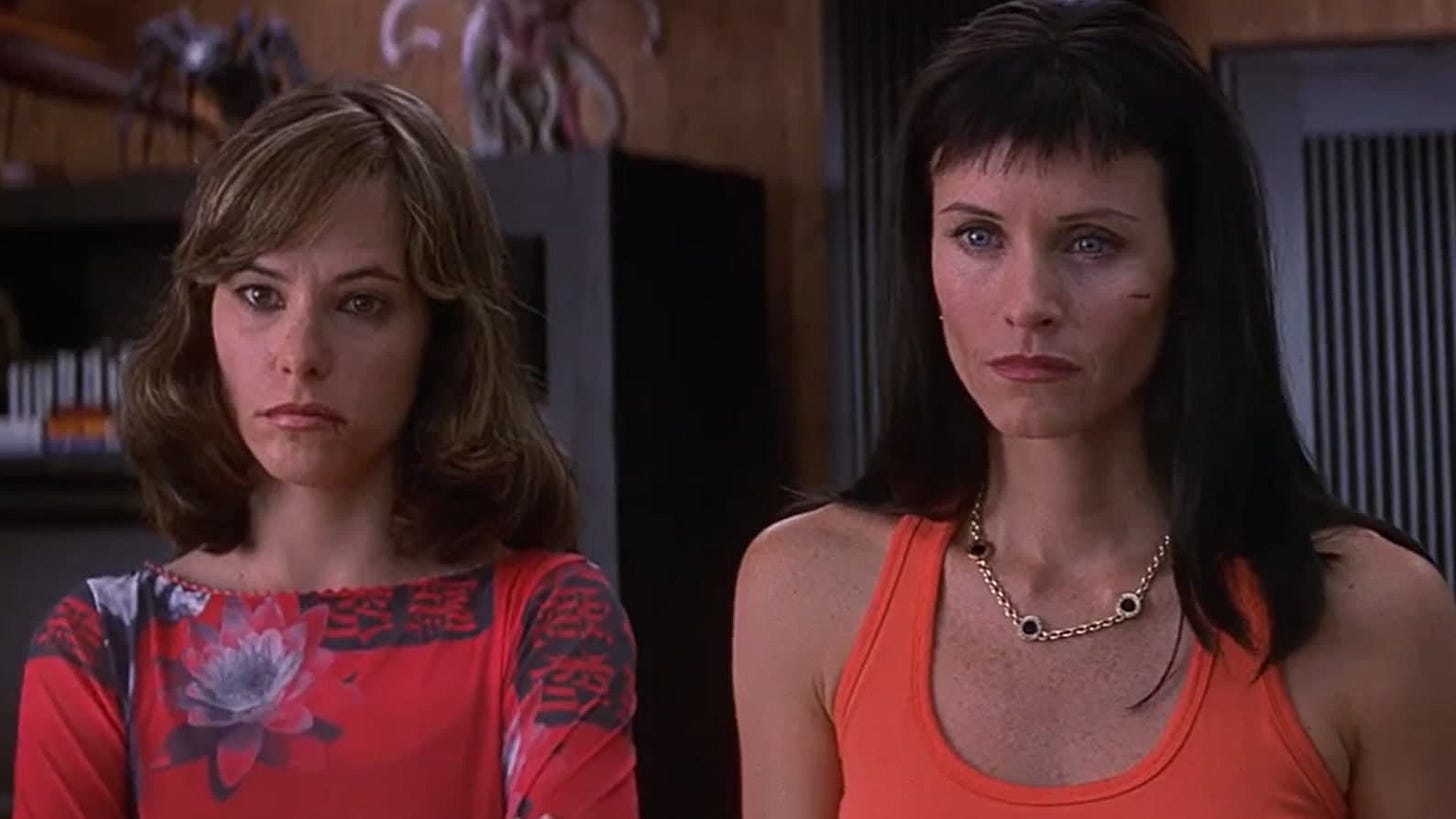
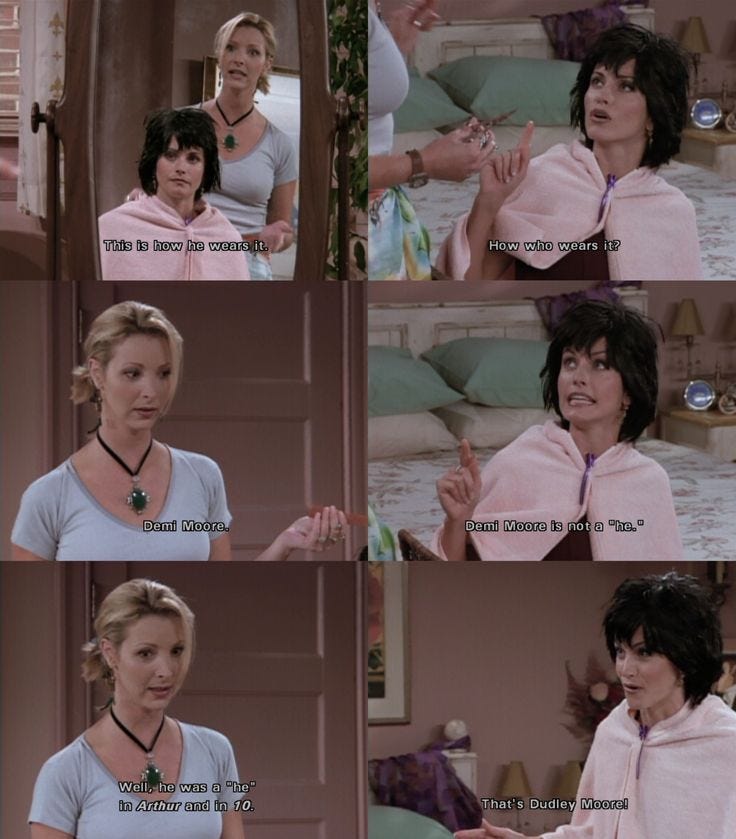

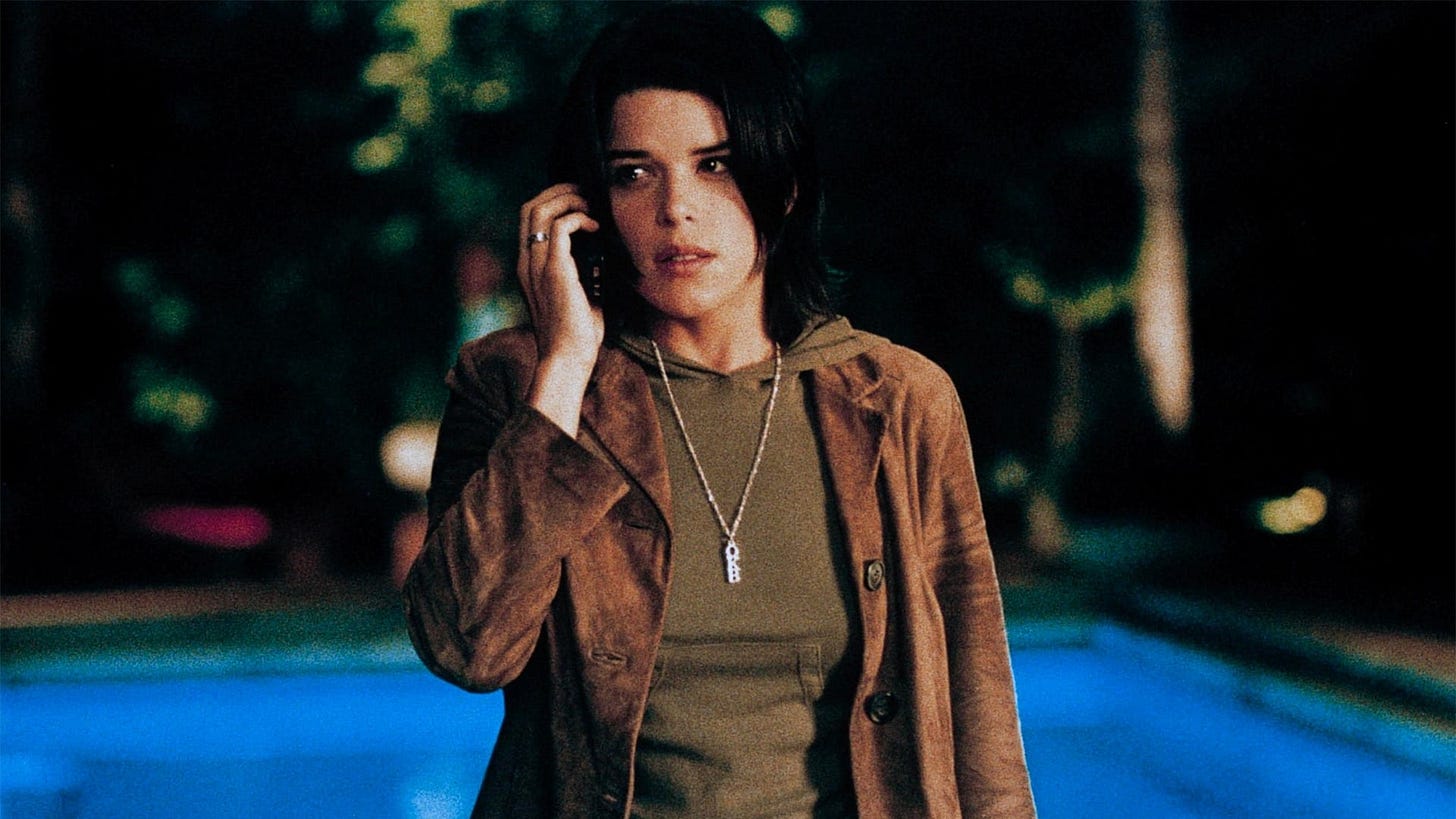
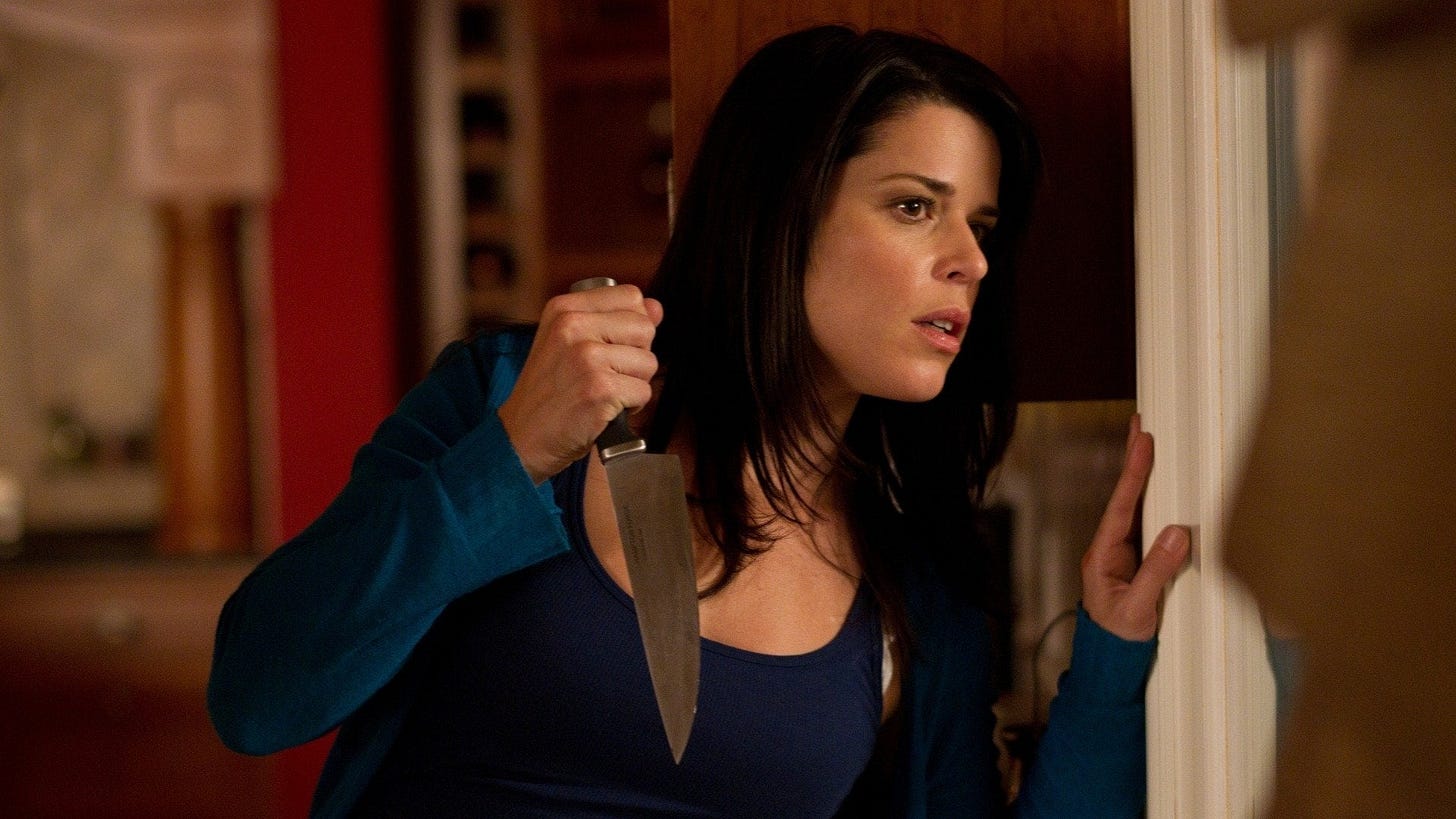
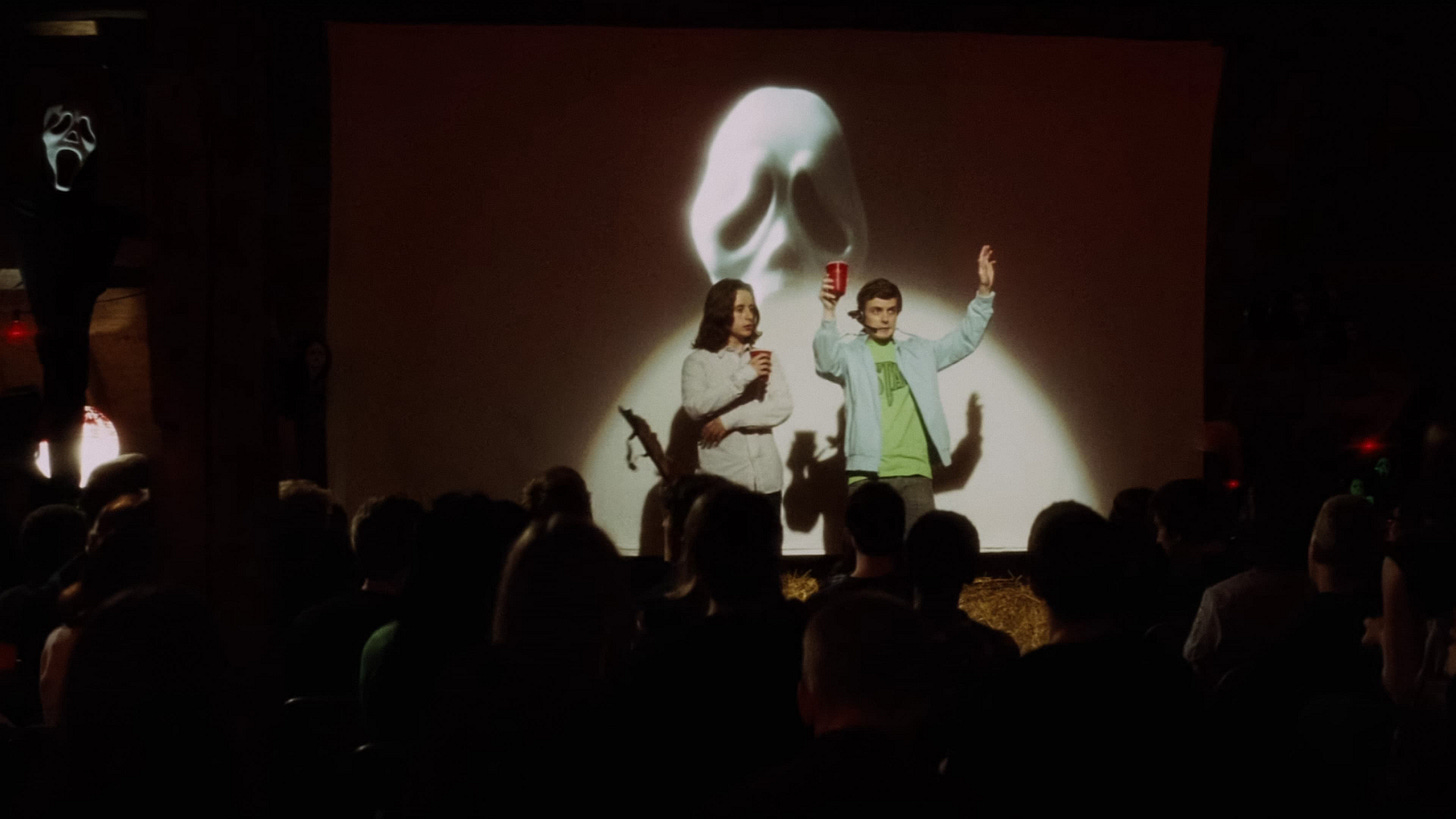
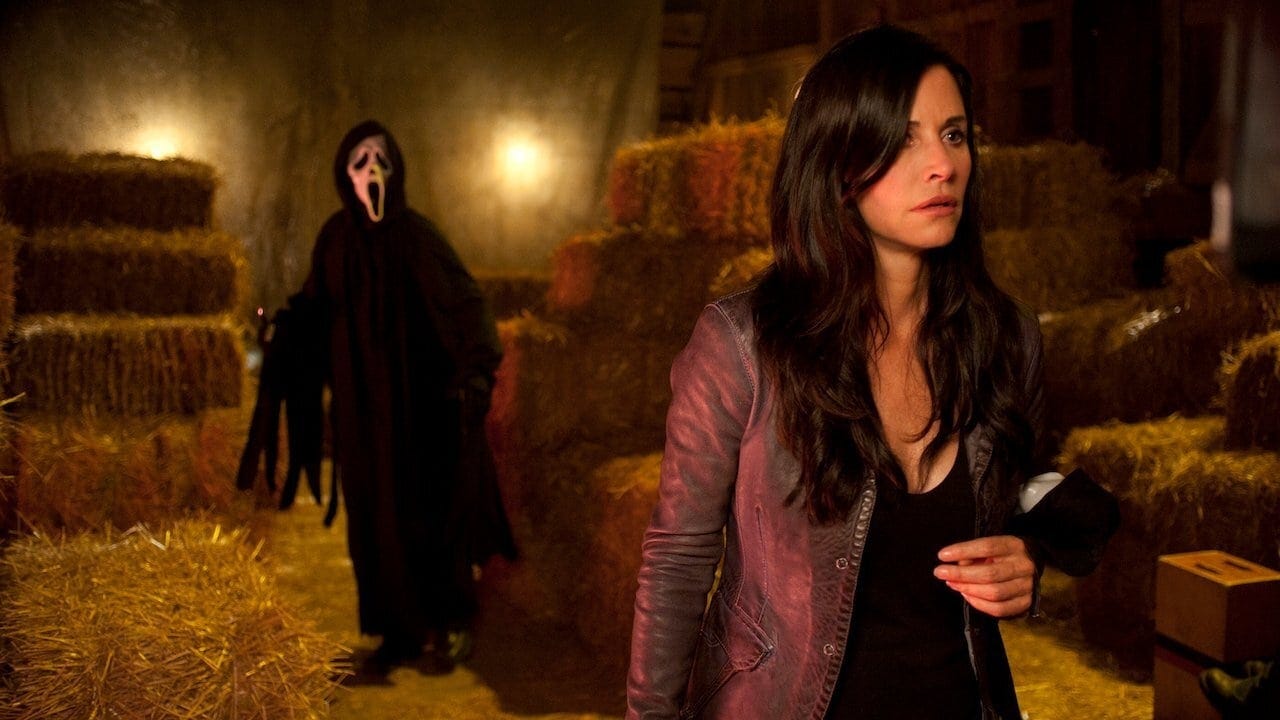
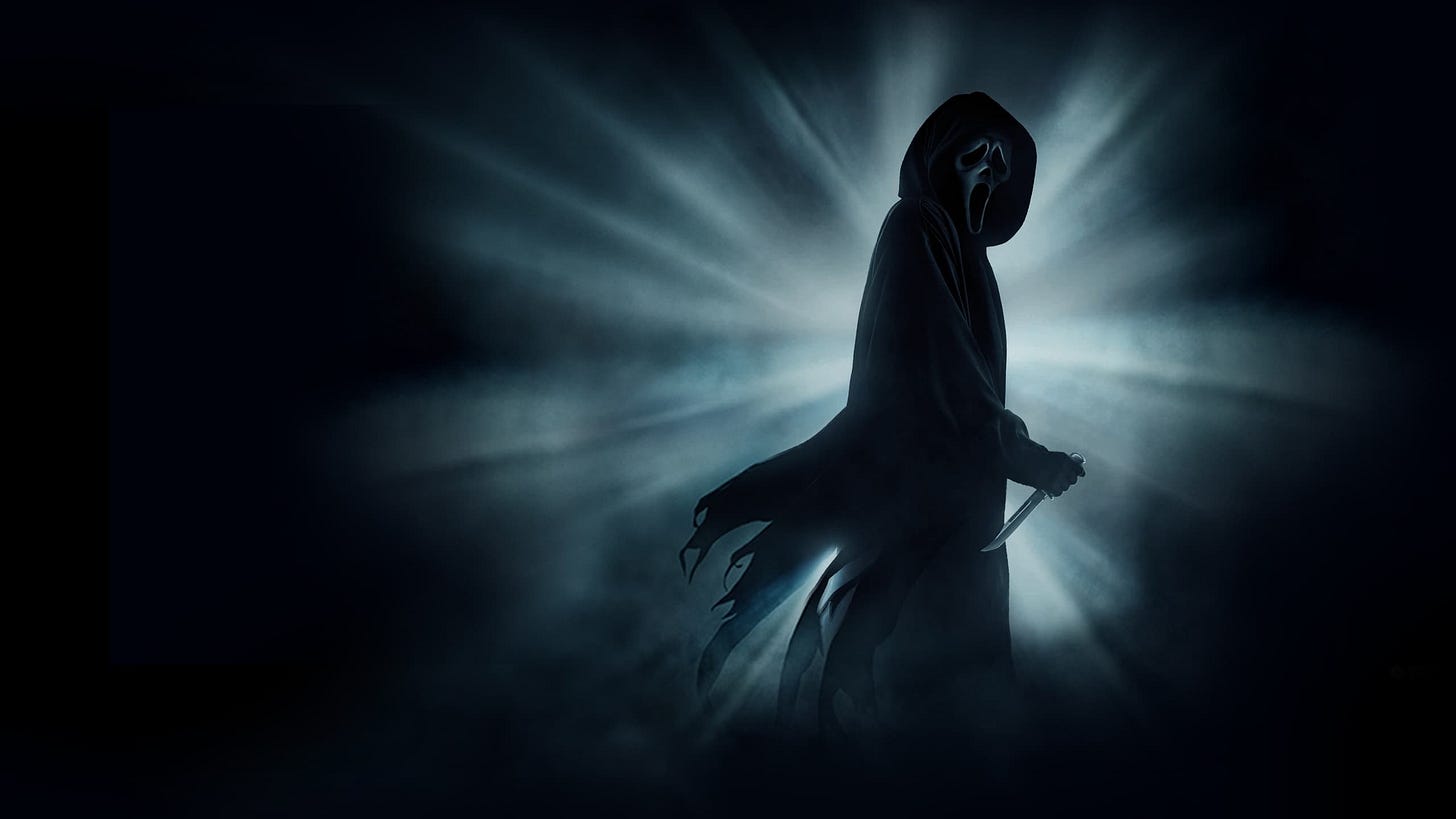
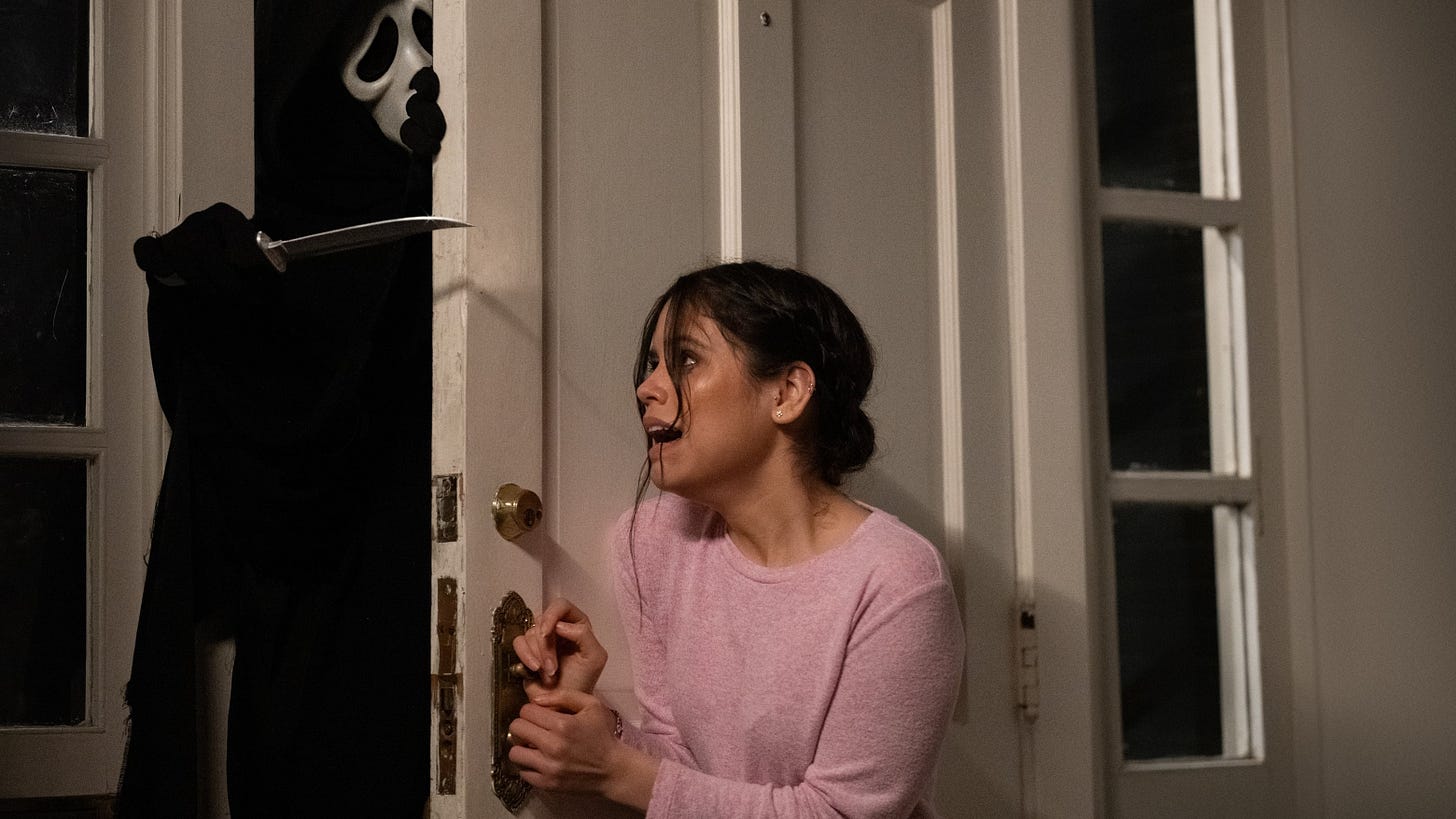
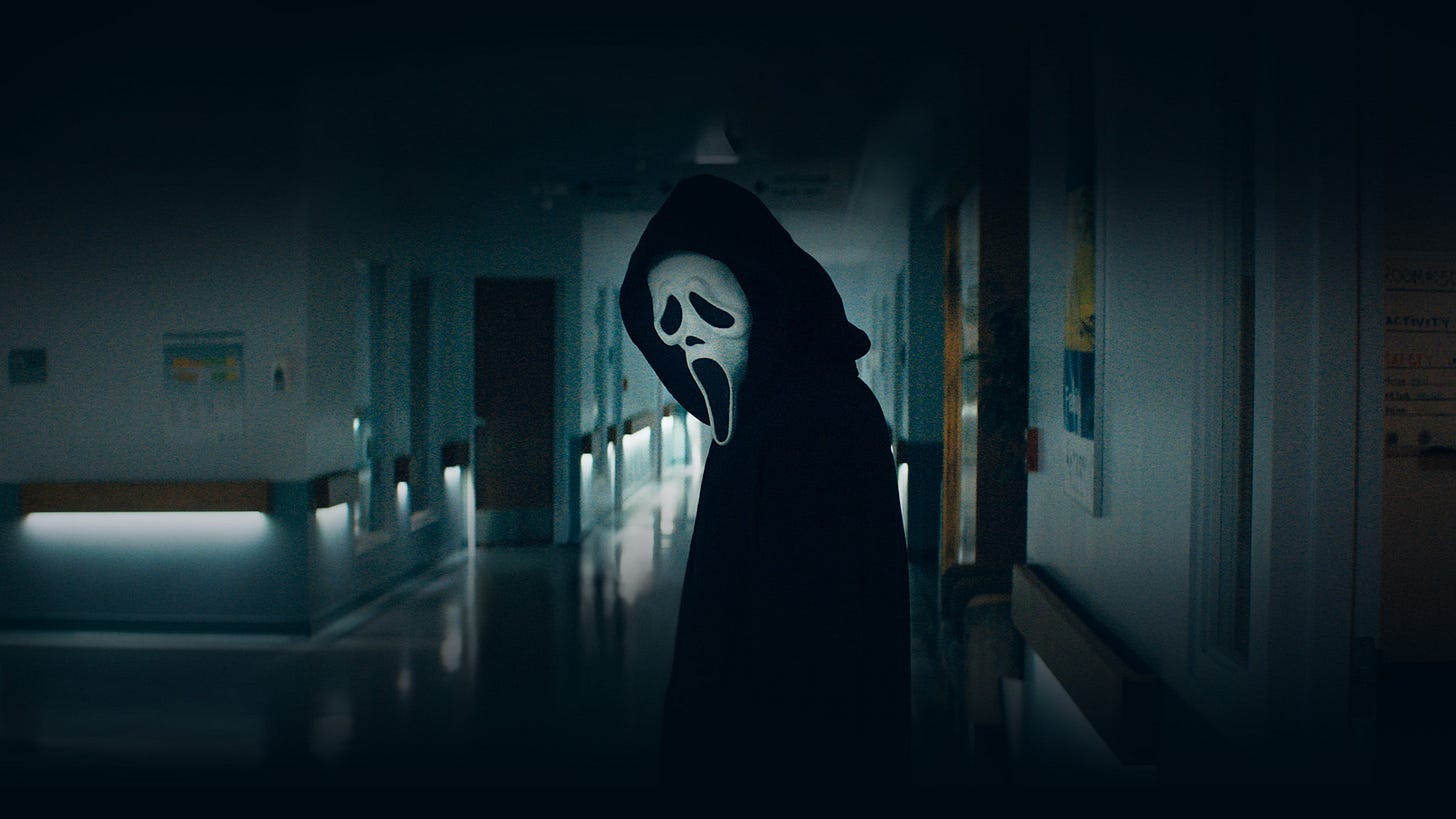
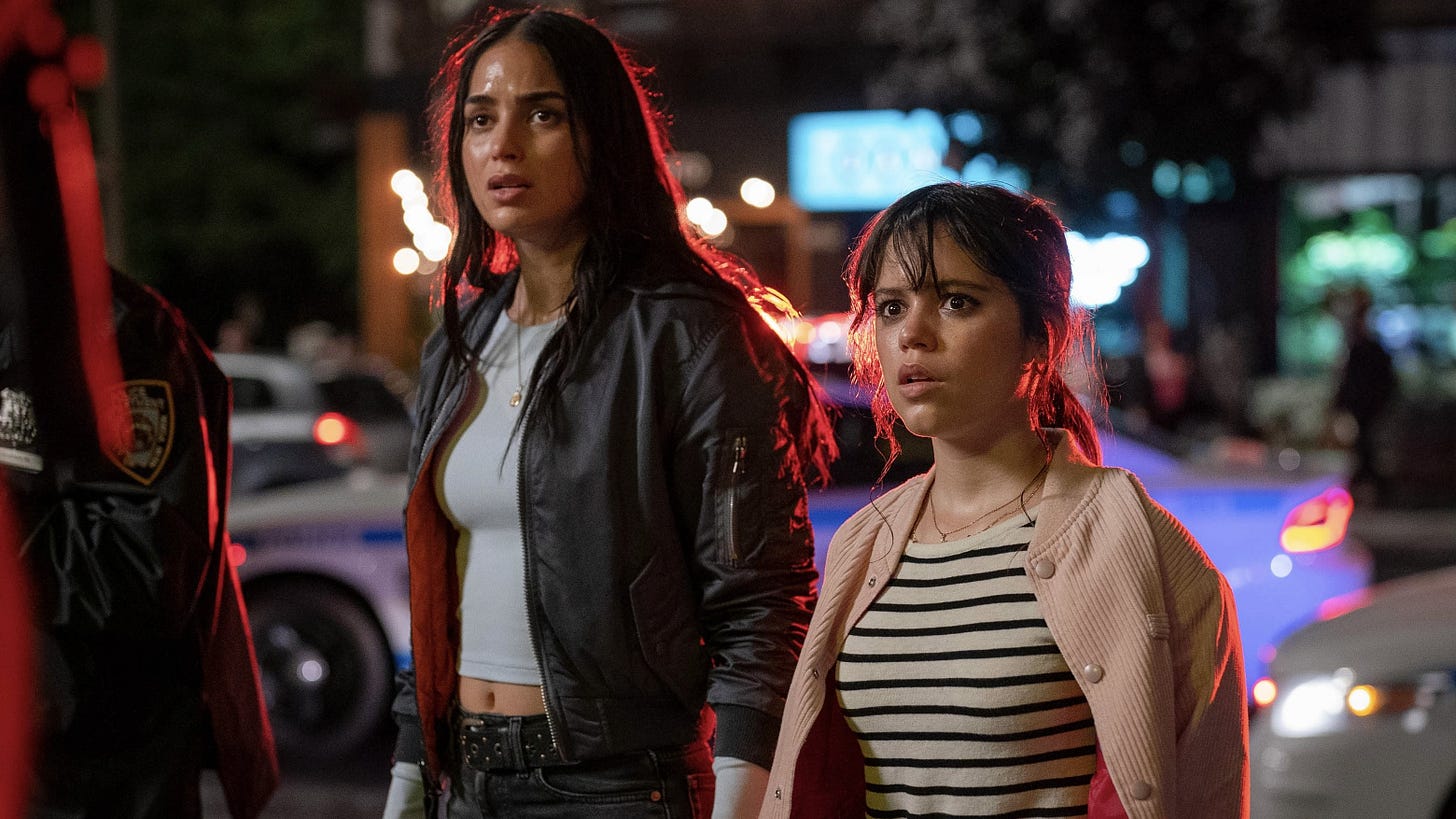
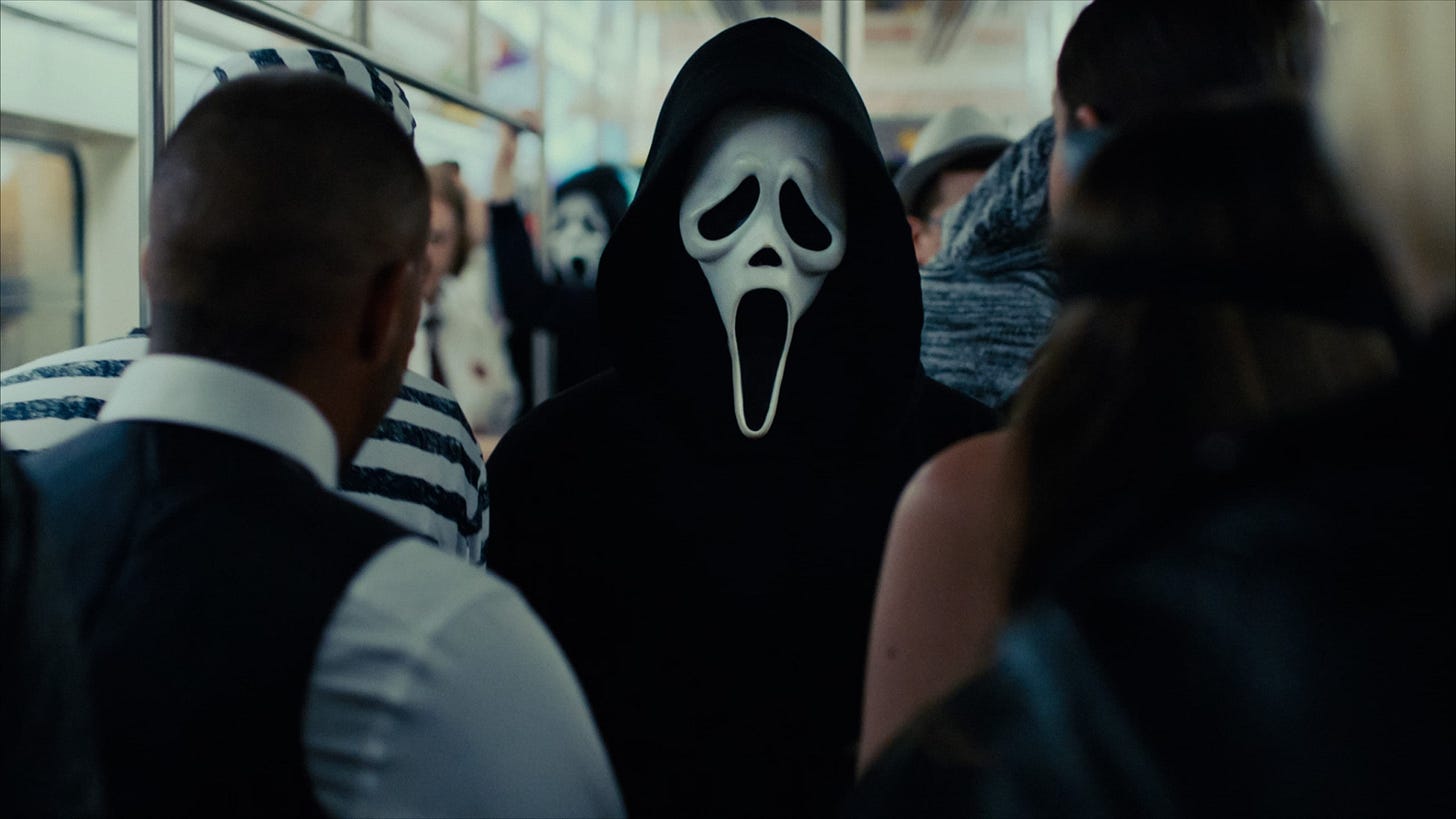
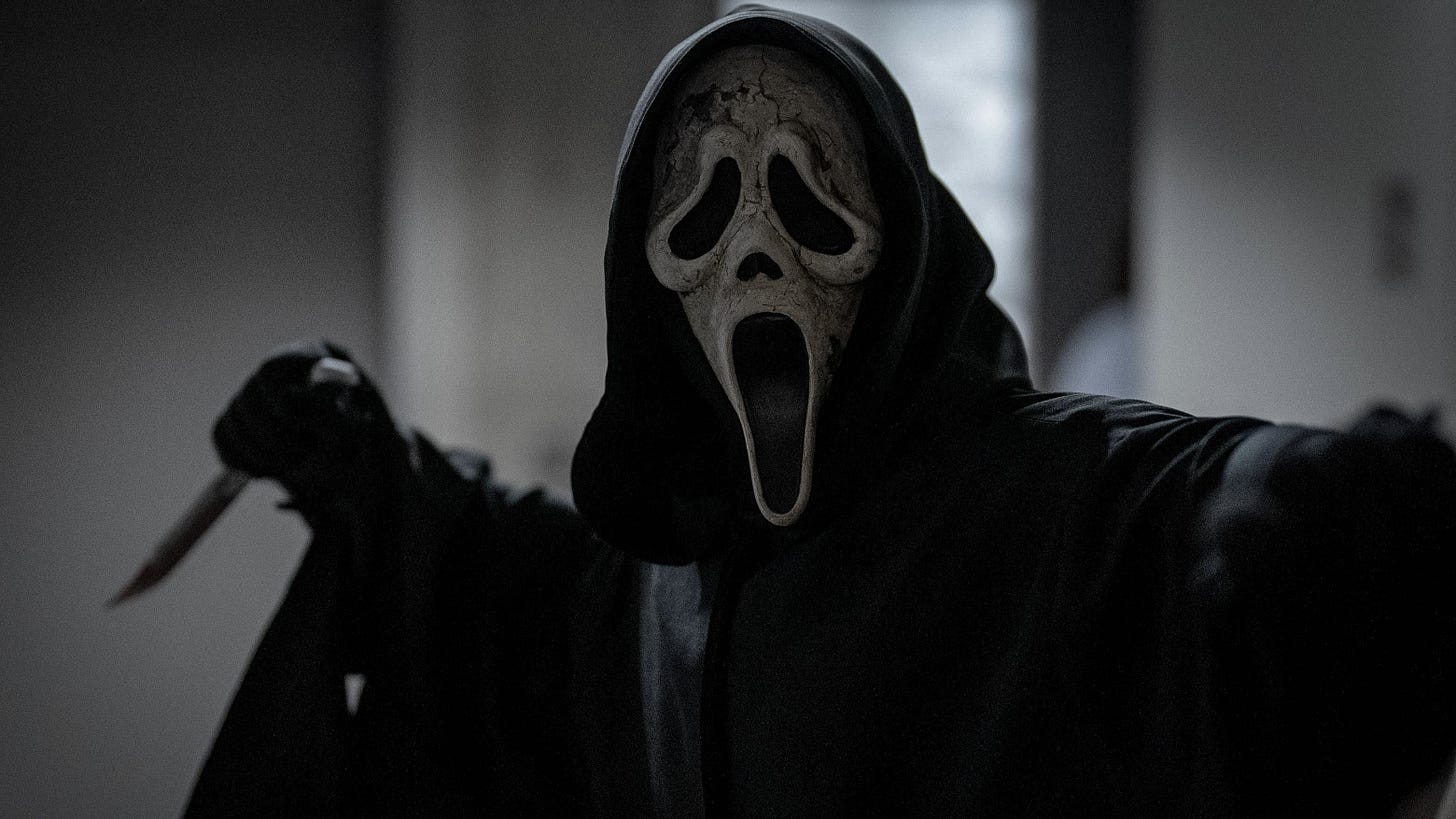
That was a really fun read, and now I want to go through them all again myself!